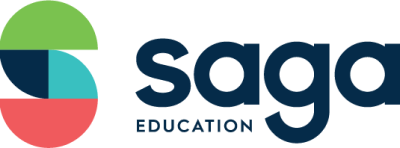
The Education Lab conducted a study that demonstrates individualized, intensive (or “high-dosage”) tutoring can double or triple the amount of math high school students learn each year, increase student grades, and reduce math and non-math course failures. The findings, which are the result of an intervention developed by the non-profit organization Saga Education, come as school districts across America grapple with the pandemic’s academic fallout, including significant learning loss among students and the acceleration of pre-existing educational disparities.
Led by a team of the world’s leading education and child development experts as co-authors, and funded by the National Institutes of Health, the MacArthur Foundation, Arnold Ventures (formerly the Laura and John Arnold Foundation), and others, the study, Not Too Late: Improving Academic Outcomes Among Adolescents, measured the impact of providing Chicago Public Schools students with daily 45-50 minute, two-on-one math instruction in 9th and 10th grades. By providing personalized instruction and coordinating closely with teachers, students, and families, tutors were able to complement in-classroom learning and help students progress two to three times faster than their peers. The results are particularly encouraging given conventional wisdom and claims by some in the research community that it is too difficult or costly to substantially improve the academic skills of children who are behind once they reach high school.
Not Too Late provides an evidence-based foundation for how schools can bring adolescents to grade level quickly and at relatively low cost (the cost per pupil in this study was $3,500 to $4,300 per participant per year; other Saga models at half that cost are undergoing evaluation now, with strong preliminary results). This is particularly important in the context of math. Eighty percent of students who drop out of high school cite course failures as their number one reason – and Algebra 1 is the course most frequently failed. In fact, many high school students are three or more years behind grade level in math, a pressing challenge for America’s schools that has been exacerbated by the pandemic.
The report, which involved two separate randomized control trials, also found:
Student learning gains persisted: A year or two after tutoring, students continued to see persistent gains in math test scores and GPA.
Learning gains were made across subjects: Intensive math tutoring was found to have spillover effects across subjects, as student grades increased in math and non-math courses.
Gains can help reduce achievement gaps COVID-19 has accelerated: Students who received Saga tutoring learned as much as an extra two and a half years of math in one academic year.
High-dose tutoring is one of the most cost-effective academic interventions: The estimated benefit-cost ratio for Saga high-dosage tutoring is comparable to that of the many successful early-childhood programs, like the Abecedarian Project and the Perry Preschool Program.
Saga’s tutoring model can support in-classroom learning at scale: By providing personalized tutoring to students at a low-cost — and by using recent college graduates, retirees, or career-switchers — Saga’s intervention can reduce the variability of academic achievement in classroom settings at scale, an issue teachers report is one of the most challenging aspects of their jobs.
This press release was originally published by the University of Chicago Urban Education Labs.
